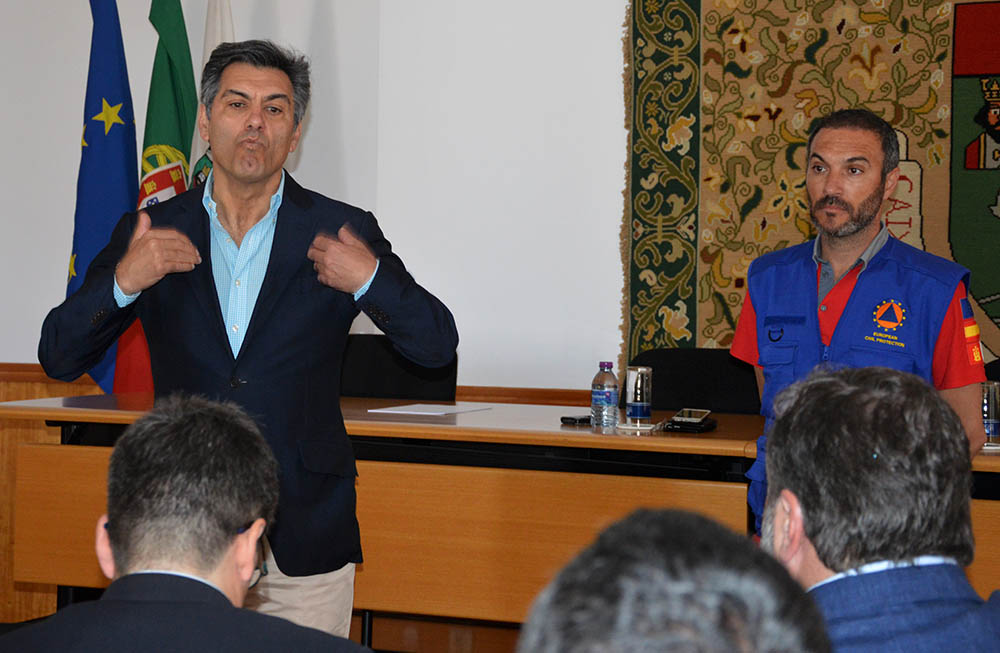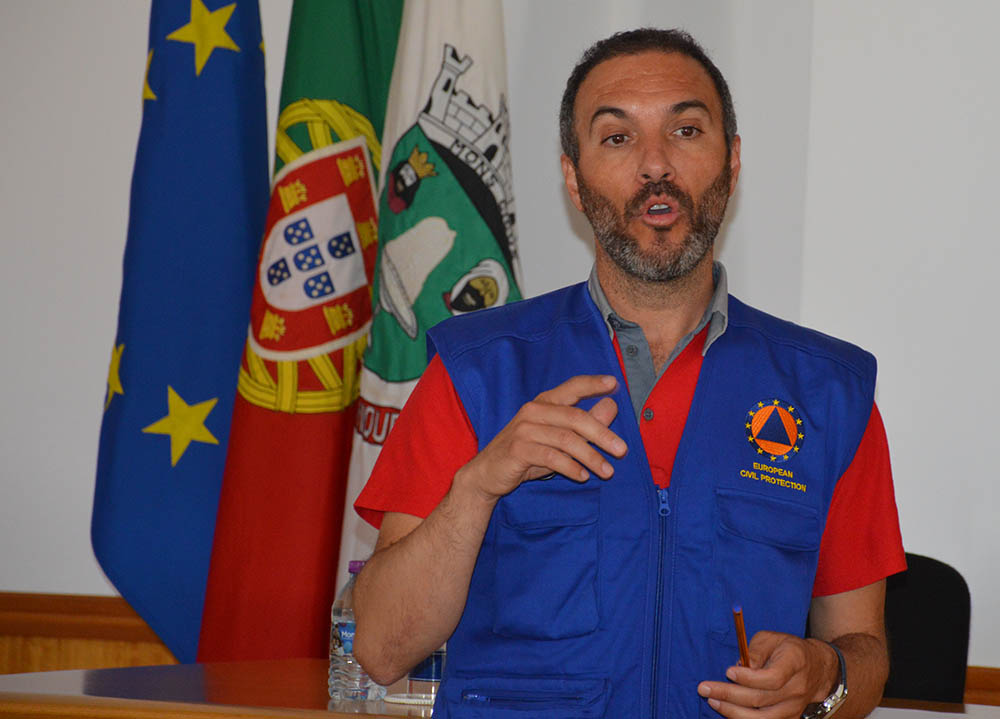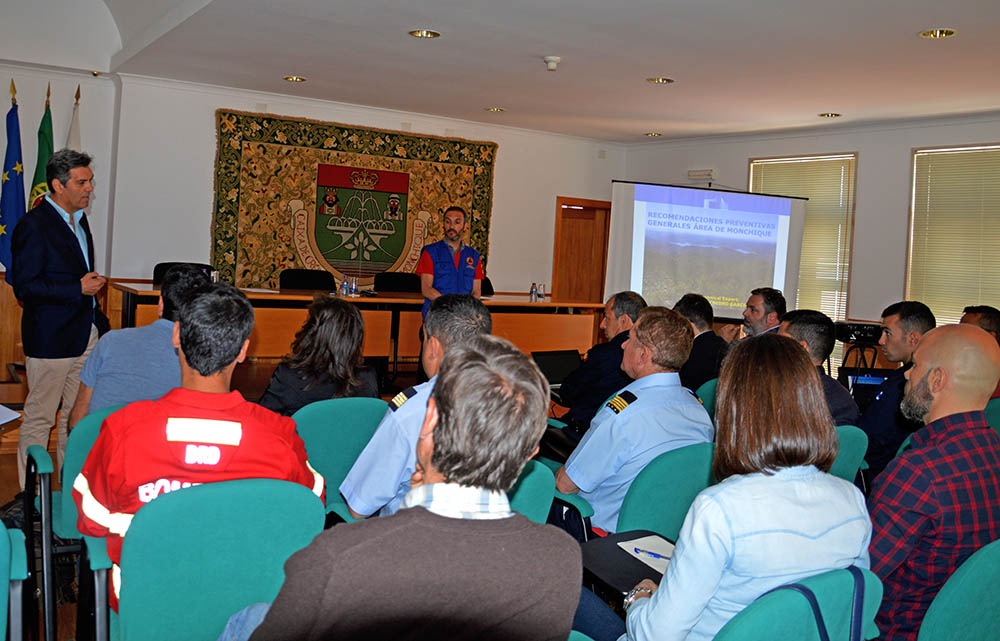 The Algarve is "one of the regions of the country where there is a greater risk of fire" next summer, revealed yesterday the Secretary of State for Forests and Rural Development, in Monchique.
The Algarve is "one of the regions of the country where there is a greater risk of fire" next summer, revealed yesterday the Secretary of State for Forests and Rural Development, in Monchique.
This is because, said Miguel Freitas, the region «did not burn last year», which, according to what is known about rural and forest fires in our country, increases the risk of burning now. That is why the Algarve is being, along with other regions where the risk is also great, «the focus of a very attentive work».
The secretary of State visited the municipality of Monchique yesterday, accompanying one of the three Spanish experts who are in Portugal to analyze rural and forest fires, under the Civil Protection Mechanism of the European Union, and participated in a workshop, with operational elements from the National Civil Protection Authority (ANPC), the fire brigades, the GNR and its Intervention Group for Protection and Relief (GIPS), the Institute for the Conservation of Nature and Forests (ICNF), chairpersons of the Board of the parish of the municipality, municipal technicians and forestry producers. Tiago Oliveira was also present, president of the new Mission Structure for the Integrated Management of Rural Fires.
Speaking to journalists, the member of the Government revealed that the municipalities of the Algarve had applied for the realization of «300 kilometers of fuel containment strips in a month and a half», having been «the region that applied the most».
Only Monchique, his mayor had already revealed, applied for half of that amount, 150 kilometers, 80 of which will have to be ready by the end of June.
In addition to these emergency preventive measures, Miguel Freitas underlined that Portugal has "a fire-fighting device that is experienced, well-controlled, but the risk and danger exist", for which the Government maintains the "level of concern". Hence, he explained, the need to "bring experts to dialogue with the technicians."
"We have not managed, from one year to the next, to change everything, but we have managed to do the most urgent thing, to signal to people that there is a risk with the forest we have," the secretary of State had already said at the beginning of the session in Monchique .

Rui André, Mayor of Monchique, one of the municipalities that for years has been seeking to implement an active policy of prevention and defending the transfer of more competences in the forestry area to the municipalities, underlined, in turn, that « the Government has the merit of having managed to put on the agenda a topic that, for us, is central».
"We depend on the forest for all other economic activities, including Tourism", added the mayor, at the meeting that aimed to raise awareness of the importance of joint prevention work, in order to minimize the risk of major fires in the Monchique mountains .
Despite Monchique's commitment to immediate prevention measures – it is the municipality of the Algarve that has applied for the most kilometers of containment strips -, Rui André defended the need to "advance with structural measures for spatial planning".
“The devastating fires of 2003, in the Monchique mountains, were a lost opportunity. We thought that there would be a change, a change in the order, but everything remained the same», he recalled. In 2016, «almost 2000 hectares of Monchique and Portimão were burned, but two years later, people are still waiting for the promised support».
The Municipality of Monchique itself, following this most recent fire, "made a candidacy, but had cuts of 87%", while "people who applied to change from eucalyptus to strawberry tree saw their candidacies all disapproved". “If it's not on these occasions that you take the opportunity to change things, when does that happen?”, asked the Monchiquense mayor.
Therefore, stressed Rui André, this is «a window of opportunity to adopt structural measures for the future of our forest».
The mayor argued that it is necessary "not to have rules made with ruler and square, the same everywhere, but adapted to each territory."
Rui André, who had been following much of the visit that Spanish expert Juan Pedro Garcia Alonso made, for two days, to Serra de Monchique and the neighboring municipality of Ourique, admitted that the containment strips that are now advancing may not have great effects, as, moreover, the expert would later emphasize. «In the municipality of Monchique, the danger, even with all these kilometers of tracks made, will not be that different, because there are fire projections from great distances. Maybe, we have to see things on a different scale, we have to better study the fire progression strategies, we have to change a lot the structure of our forest, involving private companies», stressed the mayor.

The presence of the Spanish expert in Monchique visibly upset Vaz Pinto, District Commander of Relief Operations, as it happened in the rest of the country, with the other responsible for the ANPC.
But Juan Pedro Garcia made a point of stressing that he was not coming “to say anything that they do not already know”, nor was he coming “to say in Spanish what you already know in Portuguese”. And, in fact, he practically did not refer to the issue of fighting flames, the one in which Vaz Pinto and the firefighters are specialists, but rather to prevention and planning, competences that, in Portugal, have nothing to do with the ANPC, until because they are under the responsibility of a different Ministry, that of Agriculture.
And Rui André, mayor, fed up with watching his county's destruction by flames, said: “if we so often say that fire has no borders, the solutions to fight it also have no language or flag. It is the knowledge and joint work and cooperation among all that the best results are expected».
Based on his experience in Spain, where Juan is responsible, in a certain area and at the same time, for preventing and fighting fires, the Spanish expert came to share the results of his assessment in the field.
And what are your conclusions? For now, «at the scale of the landscape, the territory is not prepared for the great forest fire», being «a non-resilient, non-adapted landscape». «The cork oak is tremendously resilient to fire, first because it's kind of here, then because it has cork, which protects it from fire. But this and other species here are disappearing. And acacia, rockrose, opportunistic species that later become a problem are advancing.
Another problem identified by the Spanish expert is the presence of many houses in the middle of the forest, which increases the danger, as well as “the continuity of the forest surface”, with kilometers and kilometers of the same species, especially eucalyptus.
Now, he underlined, for the forest to be organized in a more fire-resistant way, it was necessary for it to be ordered “in mosaics”, alternating species and land uses. But in Monchique, as in the rest of the country – and Juan Pedro Garcia Alonso was also in the Natural Parks of Sintra-Cascais and São Mamede (Portalegre) -, what is lost sight of is the “continuity of the forest surface” .
And the Spanish expert was not at all convinced about the effectiveness of the fuel containment strips, which are now being implemented in the field. Already the mayor Rui André had expressed the same doubt. "If there are bands, it's because there is continuity and that doesn't stop the fire from progressing," said Juan.
The expert also identified “preventive planning based on a primary network of strips, which has not been evaluated nor strategically designed, depending on the fire's behavior”. "The strip networks continue the forest surface available for fire," he insisted. What is needed, he argued, is to create a mosaic system that denies the flames pasture.
Stressing that “a technician is not a legislator, we just have to show and assess the reality”, Juan underlined that “before, people worked in the fields, had animals, grazed, made use of the forest's resources in other ways. Today, the new residents, with their motorhomes or luxury houses among the trees, do nothing like that and are not aware of the dangers of fire”. Therefore, he also defended the need for “self-protection plans” and for moving towards a situation of “shared responsibility”.
It also concluded that there is an urgent need for "comprehensive defense planning, for the entire territory, for all uses and all risks", using a "known methodology for the study of the territory", which "implements diagnostic and simulation indexes", which " evaluate the results obtained, which are always dynamic”, to “not go after the fire”.
Finally, stressed Juan Pedro Garcia Alonso, it is necessary to be aware that "the fire will always be here!" and the "only way to combat this is to make the landscape resilient". But this change, he never tired of stressing, does not only involve conjunctural and emergency measures, such as the creation of a network of strips, but also profound changes in the structure of the forest.
“You cannot lie to politicians and say: this could not be predicted. Yes, it can be predicted, but studies are lacking. And sometimes you don't like the results of the studies», he said.
"I have never seen a landscape so little resilient to fire, so vulnerable, as I saw here in Portugal," concluded the expert sent to our country under the European Union Civil Protection Mechanism.
Commander Vaz Pinto was keen to stress that the task of changing the Portuguese forest in general and that of Monchique in particular, “cannot be done overnight. This takes at least ten years».
Faced with the issues that were being pointed out by the Spanish expert, Vaz Pinto said: "we are aware of our vulnerabilities", knowing, for example, that "each year that burns less, more area is available to burn in the following year", hence the concern with the Algarve.
But Vaz Pinto also admitted that “our mission is much more difficult with these cluttered spaces. The combat mission would be easier if the forest and rural space were more orderly». And the District Operational Commander himself was keen to highlight the division that, in Portugal, there is between prevention, under the responsibility of the Ministry of Agriculture and, in part, also of the Environment, through the ICNF, and combat, under the responsibility of the Ministry of Administration Internal.
"It's not for lack of legal instruments that things weren't done, it's more for lack of will," he said.
Clarifying that, deep down, they were both saying very similar things, Juan Pedro Garcia Alonso concluded: "a society like ours cannot sit idly by waiting for everything to be resolved." Even because «within 10 years, the fireworks are different». "And we have to prepare now," concluded Vaz Pinto.



















Comments